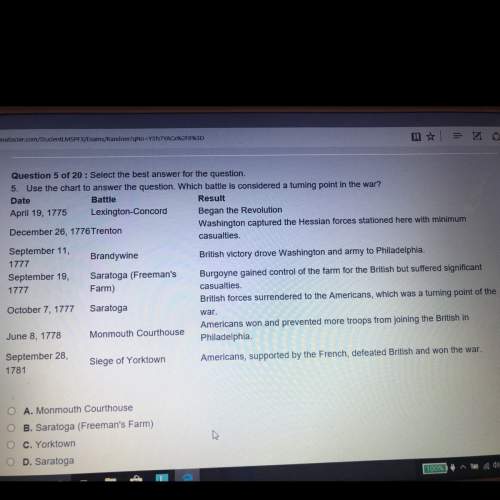
History, 21.12.2019 14:31 harveyangel123p2tjae
1. the case of schenck v. united states (1919) concerned protest activities against american involvement in world war i. justice oliver wendell holmes, jr., said that trying to convince draft-age men to resist induction was intended to result in a crime, and posed a “clear and present danger” of succeeding. the supreme court decision in the case relates to a limitation on which of the following? (1 point)
freedom of the press
free exercise of religion
freedom of speech
cruel and unusual punishment
2. which of the following supports the idea that yelling “bomb! ” is not protected by the constitution? (1 point)
separation of church and state
rights of the accused
rights not absolute
popular sovereignty
3.
speech is powerful. it can stir people to action, move them to tears of both joy and sorrow, inflict great pain. on the facts before us, we cannot react to that pain by punishing the speaker. as a nation, we have chosen a different course—to protect even hurtful speech on public issues to ensure that we do not stifle public debate.
this quotation from justice roberts’s opinion in snyder v. relates to which of the following?
(1 point)
first amendment
second amendment
fourth amendment
sixth amendment
4. with respect to the fourth amendment, to which of the following does the phrase probable cause apply? (1 point)
chain of reasoning
reasonable suspicion of a crime
double jeopardy
prior restraint
5. how did the supreme court decide in the case of texas v. johnson (1989), a case about flag burning? (1 point)
the court condemned flag burning as treason, and therefore decided it was a crime punishable under the law.
the court condemned flag burning as intimidation and decided that punishment was to be determined by state courts.
the court regarded flag burning as political expression, and therefore decided it was a form of protected speech under the first amendment.
the court decided that flag burning is an action subject to prior restraint.
6.
the constitutional prohibition against laws respecting an establishment of religion must at least mean that, in this country, it is no part of the business of government to compose official prayers for any group of the american people to recite as part of a religious program carried on by government."
–justice hugo black, from the decision in engel v. vitale (1962)
to which clause in the bill of rights does this quotation most specifically relate?
(1 point)
the establishment clause
the free exercise clause
the cruel and unusual punishment clause
the self-incrimination clause
7. which is, by design, most removed from popular control? (1 point)
state governor
state house of representatives
state senate
state supreme court
8. what term is often used for a state legislature? (1 point)
assembly
authority
commonwealth
parish
her answer choices are
1 a and c 2b 3c 4d 5a
trying to a buddy get this right if you're not going to don't comment nobody wants to hear you opinion nobody cares ..

Answers: 2


Another question on History

History, 21.06.2019 21:00
In western europe, under the , jews enjoyed some autonomy. then, during the post–french revolution period, was also tolerant toward the jews.
Answers: 2

History, 21.06.2019 23:30
Why did france demand that germany repay their debts in foreign currency?
Answers: 1

History, 22.06.2019 03:20
What important waterway was controlled through the victory at fort crown point? the st. lawrence river the hudson river the great lakes lake champlain
Answers: 1

History, 22.06.2019 05:30
Afeature that an organism __ and reproduce in its environment is called a
Answers: 1
You know the right answer?
1. the case of schenck v. united states (1919) concerned protest activities against american involve...
Questions



Mathematics, 25.12.2021 14:00

Advanced Placement (AP), 25.12.2021 14:00

SAT, 25.12.2021 14:00


English, 25.12.2021 14:00

World Languages, 25.12.2021 14:00



Business, 25.12.2021 14:00


Mathematics, 25.12.2021 14:00

Biology, 25.12.2021 14:00



SAT, 25.12.2021 14:00


World Languages, 25.12.2021 14:00




